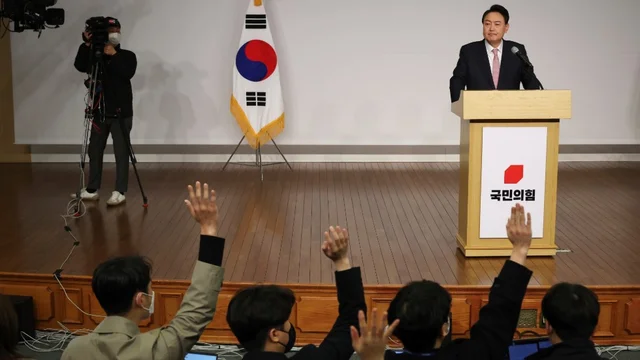This article was published on The Hill.
If democracy, as Winston Churchill once mused, is indeed the “worst form of government except all those already tried,” then South Koreans can take comfort in having elected the least undesirable candidate among all contenders for the presidency.
On Wednesday, Yoon Suk-yeol, a former top prosecutor and political novice, prevailed over the smooth-talking Lee Jae-Myung, a former mayor and governor. In garnering 48.56 percent of the total votes to Lee’s 47.83 percent — 247,077 more votes, with a 0.73 percentage points differential — Yoon has set a Korean record for the slimmest margin of victory in a presidential election.
Compared with North Korean leader Kim Jong Un’s unbroken streak of 100 percent votes and approval ratings, or even the more earthly 2020 win by President Biden with 51.3 percent of the votes, Yoon’s numbers appear modest. But they are higher than both Donald’s Trump’s mark (45.9 percent) and Hillary Clinton’s (48.0 percent) in the 2016 race. More importantly, Yoon’s tally is markedly higher than the outgoing President Moon Jae-In’s in 2017, when he won with a mere 41.09 percent. And Yoon has won nearly 3 million more ballots than Moon did five years ago (16.4 million v. 13.4 million). The difference gives Yoon the mandate and imperative, once he assumes office on May 10, to redirect his democratic nation from the undemocratic course chosen by his soon-to-be predecessor.
In fact, it is Moon’s distinctly undistinguished legacy and the public’s thirst for change, rather than any discernible political acumen on Yoon’s part, that has carried the former prosecutor general to victory.
Senior South Korean prosecutors long have been stereotyped, with some basis, as “stiff-necked.” Yoon lends himself to the stereotype. He comes across not only as imperious and inflexible but also prone to gaffes and insensitive remarks. On the other hand, he has doggedly abided by principles. As a prosecutor, he investigated his nation’s spy chief for election-meddling. In 2017, he sought the maximum sentence of 30 years for the impeached President Park Geun Hye. Park was sentenced at first to 30 years for bribery and corruption, before her sentence was reduced to 20 years. In connection to Park’s case, Yoon also indicted the head of Samsung Electronics. Later, Yoon had another former president, Lee Myung-Bak, arrested for corruption.
Impressed by Yoon’s utility in Moon’s campaign of “eradicating deeply-rooted evils” — also known as political revenge against opponents — in July 2019, Moon appointed Yoon as prosecutor general. The president called on Yoon to be “strict” even with the powers-that-be. The next month, much to Moon’s surprise, Yoon quite literally carried out his exhortation. He took the same hard-nosed stance even against Cho Kuk, Moon’s confidant and Justice Minister. Much to Moon’s chagrin, Yoon indicted Cho (and his wife) for alleged abuse of power, falsification of records, graft, embezzlement and corruption. Last year, Cho’s wife was sentenced to four years in prison; Cho’s case is still pending.
It is the public’s appreciation for Yoon’s principles — that he does not yield to political pressure — that has made Yoon, a relatively unknown and visibly unsmooth political neophyte, into the president-elect. This perception matters and will be an asset throughout Yoon’s presidency, for South Korea faces numerous domestic and foreign challenges.
To read more, please click here.
Sung-Yoon Lee is Kim Koo-Korea Foundation Professor of Korean Studies and assistant professor at The Fletcher School of Law and Diplomacy, Tufts University, and faculty associate at the U.S.-Japan Program, the Weatherhead Center for International Affairs, Harvard University.


